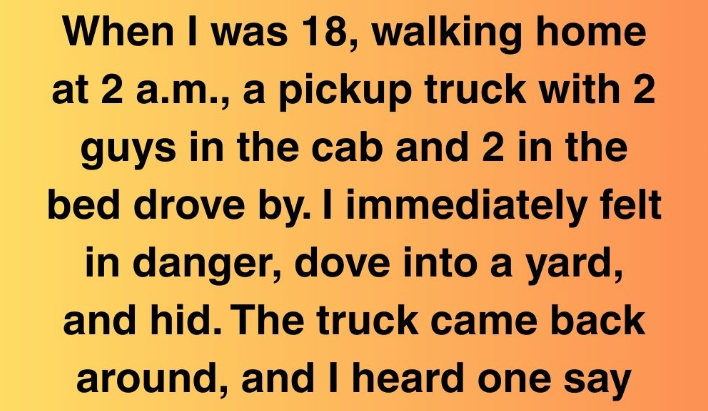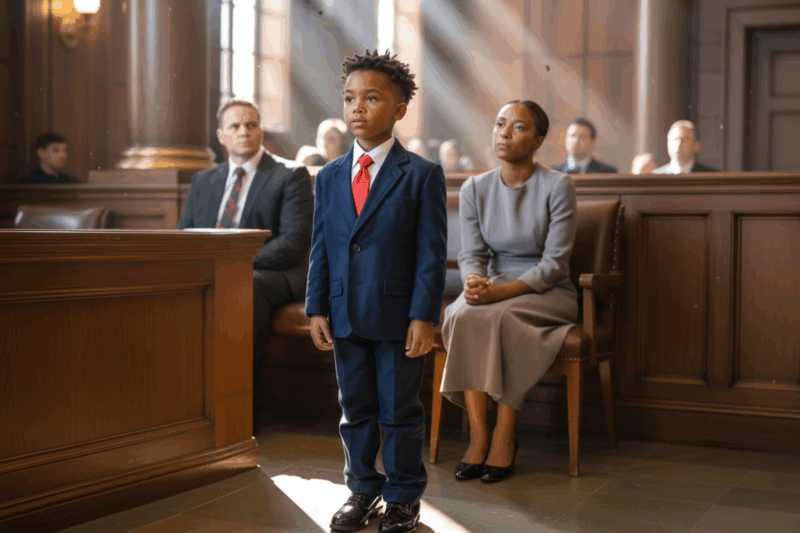At 18, I found myself walking home at 2 a.m., the streets quiet except for the low rumble of a pickup truck passing by, carrying two men in the cab and two in the bed. A chill ran through me, urging me to dive into a nearby yard and take cover. The truck circled back, and I overheard one of them say, “Where’d she go? She was right there.”
Crouched behind a hedge of wild rosemary, I held my breath, my heart thumping so fiercely I feared it would betray my hiding spot. One of the men leapt from the truck, his boots grinding against the gravel as he swept a flashlight across the yards. Their boldness made it clear: this was a hunt, and I was their prey.
I had kicked off my heels earlier, leaving me barefoot, my left ankle aching from a clumsy leap over a fence. I didn’t even know whose yard I was in. My phone was dead, leaving me stranded. In that moment, I thought, If this is the end, it’ll be in a stranger’s bushes, dressed in a sequined crop top with one earring dangling.
A dog’s bark echoed from a few houses away. The man with the flashlight grumbled something, climbed back into the truck, and they sped off, tires screeching. I stayed frozen in the yard for another fifteen minutes, too terrified to stir.
Then, a porch light glowed. A screen door groaned open.
“Hello?” came a sleepy voice.
An older woman appeared, clad in a faded bathrobe, clutching a coffee mug like a talisman. She peered toward the hedge.
I rose cautiously, hands raised. “I’m so sorry,” I stammered. “I was hiding. Some guys were following me.”
She didn’t panic or threaten to call the police. She simply looked me over and said, “Come inside, then. Before they return.”
Her name was Marisella, likely in her late sixties or early seventies, with the steady gaze of someone who’d weathered countless storms.
I sat at her small kitchen table as she brewed chamomile tea, sweet with too much honey. The kitchen carried the scent of cloves and bleach.
“Do you need a ride home?” she asked, passing me the mug.
I nodded but hesitated—my apartment was a forty-minute walk away, and I couldn’t bear the thought of her driving through those same streets where the truck had prowled.
“Can I stay a little longer? I think they’re still out there.”
She nodded. “You can sleep here if you’d like. You’ll be safe.”
And so I did, curling up on her floral couch beneath a crocheted blanket that smelled of mothballs and mint. Sleep barely came, but safety did.
The next morning, she served me toast and handed me a Ziploc bag of almonds “in case you need them.” We exchanged numbers, a gesture born of my need to express gratitude properly.
Months passed without contact. Life swept me forward—I graduated, took a retail job, moved into an apartment with roommates who bickered over oat milk and chargers.
Then, eight months later, I saw her again.
I was working a groggy morning shift at the corner grocery when Marisella came through my line, buying a single tomato and a bag of lentils.
I beamed. “Oh my gosh—do you remember me?”
She tilted her head. “You were hiding in my rosemary.”
I laughed. “Yes! I never thanked you properly.”
“You’re welcome,” she said, her smile soft. “Are you doing alright?”
I shrugged. “Mostly, yeah.”
From her purse, she pulled a small folded note. “Come by sometime. I host a little Sunday class—cooking, mostly. It’s good people eating real food together. You seem like you could use that.”
I didn’t visit immediately. The note sat forgotten until, three Sundays later, after a painful breakup and a breakdown in a mall bathroom, I dug it out of my wallet and went.
That class transformed my life.
It wasn’t a formal class—just five people of varied ages and backgrounds, gathered in Marisella’s kitchen to make lentil stew or cardamom bread. We’d chop vegetables, debate seasoning, and share stories. It was healing in its simplicity.
There was Osric, a former truck driver who cooked to ease the grief of losing his wife to cancer. Lianna, 22, couch-surfing after her parents disowned her for leaving school. And Khaled, a post office worker who brought vibrant spices from his sister.
Some weeks buzzed with laughter; others unfolded in quiet warmth. But it was always authentic.
Marisella didn’t hover or probe. Yet she had a gift for asking the question you didn’t know you needed. One Sunday, when I arrived late with mascara streaked under my eyes, she handed me a bowl of chopped onions and said, “Are you crumbling, or are you breaking open to something new?”
Those words lingered.
Gradually, I started arriving early, helping her prep, learning to roast garlic perfectly, to listen without cutting in, to be still.
The change crept up on me. My friends noticed first—my anxiety no longer consumed me. I stopped jumping at shadows or chasing people who didn’t care.
Then came the twist.
A year after that first cooking night, I arrived at Marisella’s to find her door slightly open.
I called her name. Silence.
The kettle screamed on the stove. A cutting board held a half-sliced eggplant.
I found her collapsed in the hallway.
I dialed 911, stayed until the ambulance arrived. It was a stroke. They said my early arrival saved her life—twenty minutes later, and she might not have made it.
She survived, but her strength waned. Her left hand trembled, and her words sometimes faltered.
So I stepped up.
I began hosting the Sunday group at her house, with Marisella nearby, correcting my measurements and playfully scolding my overconfidence.
The group persisted, blending familiar faces with new ones.
Then, another twist: one Sunday, a young woman, maybe 19 or 20, arrived late, barefoot and shaken.
“I was walking home, and this truck full of guys started following me,” she said. “I hid in a yard, and an old man told me to come inside. He fed me and said to come here, that someone would know what to do.”
I glanced at Marisella. She gave a slow, knowing nod.
It felt like a cycle completing itself.
We fed the girl, sat her down, offered tea and a blanket for the couch.
We didn’t press her with questions. She stayed for a while.
After everyone left, Marisella looked at me and said, “That’s how goodness grows. Not with grand gestures or flawless plans—just one person lifting another from the shadows.”
I nodded, tears streaming too fiercely to speak.
Two years later, Marisella passed away in her sleep, peaceful, as she’d wished.
Per her wishes, we held her memorial in her backyard, cooking her recipes, playing her old records, and burying her ashes beneath the rosemary bush.
She left her house to me.
Not in some cinematic flourish—she’d told me months earlier, signed the papers, said she had no children, didn’t want her greedy nephew inheriting it, and trusted me to keep it alive.
I still live there.
The Sunday group has grown. We take turns cooking, and a sign on the door reads, “Come hungry. Leave lighter.”
At night, I sometimes sit on the porch, thinking of that truck, how close I came to a different fate.
Marisella’s kindness didn’t only save me that night—it gave me a life worth living.
If there’s a lesson here, it’s this: Never underestimate the power of a single safe haven. You don’t need heroics or a blueprint—just a warm mug, an open door, and the courage to care.
If this story resonates, share it. You never know who’s hiding in the rosemary tonight.
👉 Like, share, or tag someone who’s been your safe haven. Let’s keep the goodness growing.




